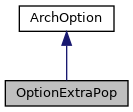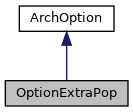Set the extrapop parameter used by the (default) prototype model. More...


Public Member Functions | |
| virtual string | apply (Architecture *glb, const string &p1, const string &p2, const string &p3) const |
| Apply a particular configuration option to the Architecture. More... | |
Additional Inherited Members | |
 Static Public Member Functions inherited from ArchOption Static Public Member Functions inherited from ArchOption | |
| static bool | onOrOff (const string &p) |
| Parse an "on" or "off" string. More... | |
 Protected Attributes inherited from ArchOption Protected Attributes inherited from ArchOption | |
| string | name |
| Name of the option. | |
Detailed Description
Set the extrapop parameter used by the (default) prototype model.
The extrapop for a function is the number of bytes popped from the stack that a calling function can assume when this function is called.
The first parameter is the integer value to use as the extrapop, or the special value "unknown" which triggers the extrapop recovery analysis.
The second parameter, if present, indicates a specific function to modify. Otherwise, the default prototype model is modified.
Member Function Documentation
◆ apply()
|
virtual |
Apply a particular configuration option to the Architecture.
This method is overloaded by the different Option classes to provide possible configuration of different parts of the Architecture. The user can provide up to three optional parameters to tailor a specific type of configuration. The method returns a confirmation/failure message as feedback.
- Parameters
-
glb is the Architecture being configured p1 is the first optional configuration string p2 is the second optional configuration string p3 is the third optional configuration string
- Returns
- a confirmation/failure message
Implements ArchOption.
The documentation for this class was generated from the following files:
- options.hh
- options.cc
 1.8.17
1.8.17